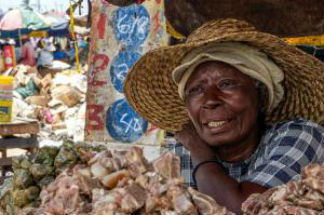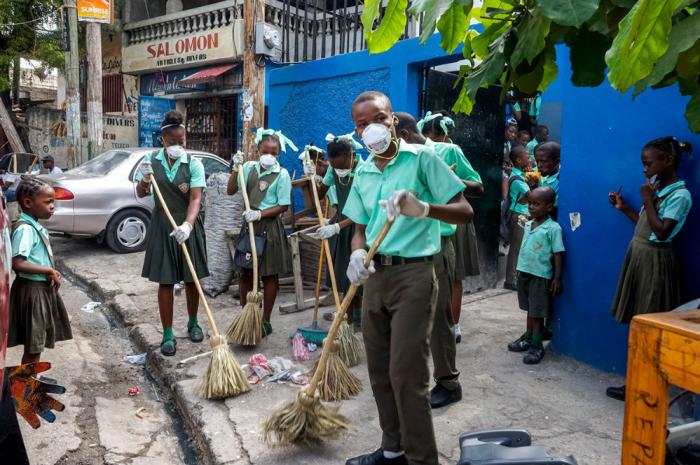Haitian capital seeks solutions to inefficient solid waste disposal
FREE Catholic Classes
The huge market known as Marche de la Croix-des-Bossales is at its peak this afternoon, with customers shuffling past hawkers and dodging mounds of trash. For 30 years, Sylvia Janvier has been selling pork and lard here.

Highlights
Catholic Online (https://www.catholic.org)
7/2/2018 (6 years ago)
Published in Living Faith
Keywords: Sylvia Janvier, Waste management, selling pork and lard
PORT-AU-PRINCE, HAITI - "Waste management is a problem at this 70,000-square-meter (753,473-square-foot) market, the largest in Port-au-Prince, Haiti's capital.
Garbage blocks the walkways and often piles up close to fresh produce, she says. Some vendors do not dispose of waste properly, the 53-year-old woman says, but authorities are to blame too. The two are not collaborating, she explains.
"Everyone is looking forward to the day when unsanitary conditions will change, but things are getting worse instead of better," Janvier says.

Service Metropolitain de Collecte de Residus Solides (SMCRS) is in charge of solid waste collection in the capital and surrounding metropolitan areas.
But for years, limited resources and labor have made it difficult for the state-appointed agency to keep certain areas clean. In a market where an estimated 110,000 tons of food are sold each day, officials are employing new approaches to reduce solid waste: awareness campaigns and penalties.
These efforts have extended to other market grounds and public spaces.Mariette Paul sells tomatoes and onions in a part of Marche de la Croix-des-Bossales, where vendors dispose of solid waste. She wears rainboots to protect her feet from the waste and muddy puddles.
According to Global Communities, an international nonprofit, the metropolitan area of Port-au-Prince produces between 1,400 and 1,600 metric tons of waste each day, which is more than the amount deposited in the capital's Truitier landfill, the country's largest dump. Households generate about 80 percent of this waste, and markets 10 percent.

Bertrand Salomon, principal private secretary to the director of SMCRS, says many factors make it difficult to collect the large amounts of waste. A lack of capital is one. The government estimates that it would cost $370 million to increase solid waste collection from 20 percent to 90 percent by 2022, according to a 2012 Ministry of Public Health and Population report.
The amount of waste generated in Haiti will continue to grow in the coming years, experts say. Salomon says this calls for a shift in waste management practices.
People litter the spaces where they conduct business, because they don't know that the unsanitary conditions can cause disease, especially in high-density settings, he says.
Poor waste management practices are common in households and schools too, says Olrich Joly, spokesman for Port-au-Prince City Hall, which he says is conducting awareness campaigns to teach market vendors and students how to dispose of waste properly.
Students at ecole Municipale Carl Brouard, a public school, participate in a cleanup exercise organized by authorities.
Emanuse Osias, 16, is a student at ecole Municipale Carl Brouard, a public school, and a participant in one of city hall's cleanup exercises to raise awareness.
"Before, I saw no problem if people dropped trash on the ground," Osias says. "Today, however, I closely monitor my fellow community members and teach them the importance of keeping our environment clean, thanks to the training I received in my school."
Dauphin Jean Wesner, a counselor at the school, says bringing the campaigns to schools is a smart move, because people will learn how to keep the environment clean while they're still young, well before entering the workforce.
To complement the campaigns, Ralph Youri Chevry, Port-au-Prince's mayor, declared littering in public spaces an offense punishable by a fine of 10,000 to 50,000 Haitian gourdes ($150 to $750).
Salomon says he is hopeful that the announcement, which came in May, will help to reduce the amount of waste found in Marche de la Croix-des-Bossales and other trading hubs.
Sylvestre Ndahayo, GPJ, translated the article from French.
Marie Michelle Felicien, Associate Reporter | Eunice Onwona, | Ndahayo Sylvestre, | Mira Galanova, | Howery Pack, | Austin Bachand for Global Press News Service.
A version of this story originally appeared on Global Press Journal.
---
'Help Give every Student and Teacher FREE resources for a world-class Moral Catholic Education'
Copyright 2021 - Distributed by Catholic Online
Join the Movement
When you sign up below, you don't just join an email list - you're joining an entire movement for Free world class Catholic education.
-

-
Mysteries of the Rosary
-
St. Faustina Kowalska
-
Litany of the Blessed Virgin Mary
-
Saint of the Day for Wednesday, Oct 4th, 2023
-
Popular Saints
-
St. Francis of Assisi
-
Bible
-
Female / Women Saints
-
7 Morning Prayers you need to get your day started with God
-
Litany of the Blessed Virgin Mary
A Future for Life: Introducing the Winners of the Priests for Life Pro-Life Essay Contest
-

Reflections on Pope Francis' 2025 World Day of Peace message
-

Exposing the Dark Reality of Sex Trafficking
-
Trump's Bold Geopolitical Moves: A Call for Reflection from a Catholic Perspective
-
Pope Francis Calls for Action Against Child Exploitation and Abuse
Daily Catholic
 Daily Readings for Thursday, January 09, 2025
Daily Readings for Thursday, January 09, 2025 St. Adrian, Abbot: Saint of the Day for Thursday, January 09, 2025
St. Adrian, Abbot: Saint of the Day for Thursday, January 09, 2025 Prayer for a Blessing on the New Year: Prayer of the Day for Tuesday, December 31, 2024
Prayer for a Blessing on the New Year: Prayer of the Day for Tuesday, December 31, 2024- Daily Readings for Wednesday, January 08, 2025
- St. Thorfinn: Saint of the Day for Wednesday, January 08, 2025
- St. Theresa of the Child Jesus: Prayer of the Day for Monday, December 30, 2024
![]()
Copyright 2024 Catholic Online. All materials contained on this site, whether written, audible or visual are the exclusive property of Catholic Online and are protected under U.S. and International copyright laws, © Copyright 2024 Catholic Online. Any unauthorized use, without prior written consent of Catholic Online is strictly forbidden and prohibited.
Catholic Online is a Project of Your Catholic Voice Foundation, a Not-for-Profit Corporation. Your Catholic Voice Foundation has been granted a recognition of tax exemption under Section 501(c)(3) of the Internal Revenue Code. Federal Tax Identification Number: 81-0596847. Your gift is tax-deductible as allowed by law.







 Daily Readings for Thursday, January 09, 2025
Daily Readings for Thursday, January 09, 2025 St. Adrian, Abbot: Saint of the Day for Thursday, January 09, 2025
St. Adrian, Abbot: Saint of the Day for Thursday, January 09, 2025 Prayer for a Blessing on the New Year: Prayer of the Day for Tuesday, December 31, 2024
Prayer for a Blessing on the New Year: Prayer of the Day for Tuesday, December 31, 2024


